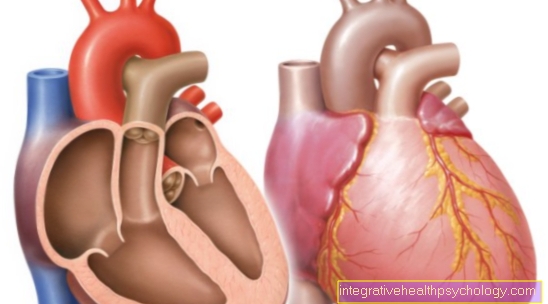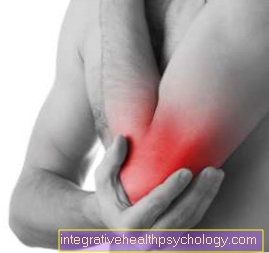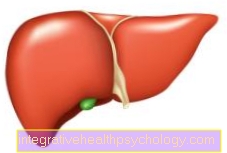L-carnitine
introduction
L-carnitine is a substance derived from carnitine that occurs throughout the human body and plays an important role in many mechanisms of energy production in cellular tissue. L-carnitine, for example, ensures that certain substances such as long-chain fatty acids are transported through the cell walls of the mitochondria (also called power plants of the cell) in order to be converted into energy there. Without L-carnitine, this process would not be possible in the body.

In addition to this important role in the fat metabolism of the cells, L-carnitine also plays an important role in the carbohydrate metabolism. Endurance athletes usually have a very high-carbohydrate diet and thus also consume less meat through food that contains a lot of L-carnitine. As a dietary supplement, L-carnitine can therefore also help to optimize fat burning in the cells of endurance athletes. This is particularly important in ultra-endurance sports, such as a marathon or a bike tour (Tour de France).
Read more on the subject at: Food supplements
L-carnitine can have a supportive effect as a supplement during endurance exercise. The maximum oxygen uptake (VO2max), which represents the transport capacity of oxygen from the air we breathe, is the limiting factor for endurance. Many studies have confirmed that L-carnitine has a positive effect on maximum oxygen uptake. VO2max could be increased significantly and the respiratory quotient also benefited in the form of a decrease. The respiratory quotient is the ratio of exhaled carbon dioxide and inhaled oxygen in the same time. The lower the respiratory quotient (RQ), the higher the fat metabolism involved in energy supply.
Read more on the topic: Supplements
L-carnitine can also help with weight loss, as it increases the proportion of fat metabolism. The prerequisite for this, however, is that the person follows a low-calorie diet, otherwise the body will have too much energy available and it will not use the fat cells to generate energy.
The higher the dosage with L-carnitine, the higher the desired weight reduction can be. However, one should think about the low calorie diet. The training should not be neglected, otherwise the energy requirement is too low to achieve the desired weight loss.
Read more on the topic: nutrition
What functions does L-carnitine have in the body?
There are two different forms of carnitine. One differentiates that L-carnitinewhich as vitamin-like nutrient takes over important functions in the body, which will be explained below, by the so-called D-carnitine, one Harmful stereoisomer of L-carnitine. In the case of a supplement, i.e. a chemically produced substance, a mixture of the two forms is created.
L-carnitine plays a special role in lipid metabolism. The body cells themselves have something called Mitochondriawhich one - for the sake of understanding - as Energy power plants who can imagine cells. In order for these power plants to work properly, they need Fatty acids. These fatty acids are not contained in the mitochondria, but must first be transported there. This one L-carnitine takes on the transport / function. L – Carnitine attaches itself to the fatty acids and funnels into the mitochondria - especially long-chain fatty acids that cannot pass through the cell wall of the mitochondria on their own. L – Carnitine is present in a certain way in every cell of the body.
Lies a L-carnitine deficiency before, so fewer fatty acids are transported into the mitochondria, so that less fat in energy can be implemented.
In addition to this "transport function" and the key function within the Fat burning In addition, L-carnitine takes part in many biochemical processes of the organism either in a direct or indirect way. For example, a medically prescribed dose of L-carnitine can improve blood lipid levels and thus improve existing ones Heart disease have a beneficial effect.
Scientific is the assumption not proventhat L – Carnitine in connection with Diets and sports one Body weight reduction can cause.
Depending on the individual synthesis performance, a Supplements be induced. This is for example at Premature babies the case, which in addition to the inadequate synthesis performance also from the low carnitine content of the Breast milk are affected.
Studies also show that Pregnant women and endurance athletes often one (too) low L-carnitine content exhibit.
Occurs in the adult Carnitine deficiency usually as a result of Synthesis defects on. This is for example with diseases in the area of kidney, but also the case with hemodyalization.
effect
It can also be ingested in small quantities through food. The effect of L-Carnitine can be found in the area of fat burning. It acts as a molecule through which the fat metabolism is boosted. It works as a "transporter" in the human organism and brings fatty acids from A to B. It increases the burning of fat molecules and thus helps with weight loss. As a result, it is often used in the fitness industry and branch.
It is also said to support muscle building, which makes it interesting for bodybuilders and fitness athletes. Furthermore, it should positively influence the ability to concentrate and also promote regeneration after a training session. The advertising industry in particular has specialized in L-carnitine as a miracle weapon for building muscle and burning fat, but so far there is no definitive scientific evidence. There are some studies that show that L-carnitine has a positive effect. However, there are also studies that cannot prove the effect, and so it has not yet been conclusively clarified whether and to what extent supplementation with L-carnitine pays off or not.
Read more on the topic: Effect of L-Carnitine
Effect on potency
In addition to the many other positive effects, L-carnitine is also said to have a positive effect on male potency. This could be proven in a study from Rome. The results are promising: if L-carnitine was taken more often and more regularly, a steadily improving erectile ability could be demonstrated in the participating men. A daily dosage of L-carnitine with 0.2 - 1 gram can already have a positive effect on potency. By improving fat metabolism and energy balance, erectile dysfunction is gradually reduced and broken down.
Read more on the topic: Erectile dysfunction
Can L-Carnitine Lower Cholesterol?
L-carnitine has other positive properties on the human body and helps, for example, in lowering high cholesterol levels. A study showed that the bad LDL cholesterol could be lowered after the addition of L-carnitine. The good HDL cholesterol remained constant. Similar studies have also shown that L-carnitine supplementation improved cholesterol levels day by day.
Palpitations as a side effect
One of the side effects of taking L-carnitine can be a palpitations. L-carnitine also has a slightly stimulating effect and can therefore lead to a racing heart if overdosed. There is simply too much energy in the organism that needs to be broken down somehow. This leads to palpitations and insomnia as more energy has to be burned.
Especially on days with little exercise, the dosage of L-carnitine should be relatively low at one to two grams. We recommend a low dosage at the beginning of approx. 250 mg (for example in capsule form). You should first slowly approach the dosage of one to two grams and wait to see how the body reacts to the amount of L-carnitine supplied.
Read more on the topic: Racing heart
Museum building
L-carnitine is considered a fat burner in the fitness industry and is taken to support muscle building. When building muscle, L-carnitine ensures that energy is always available, but that this is not created by burning muscle protein, but by burning fatty acids from the fat cells. This protects the muscle from being depleted of protein that is required for muscle building.
In addition, L-carnitine optimizes the regeneration process and thus ensures a higher level of performance during exercise. The extent to which L-carnitine as a dietary supplement can improve muscle growth has not yet been clearly clarified in studies. It has not yet been clearly clarified whether a higher dose also leads to better performance.
What is certain, however, is that L-carnitine can effectively slow down muscle breakdown in older people. Therefore, L-carnitine is also recommended for the maintenance of the muscles for older athletes. For all younger athletes, the degree of effectiveness cannot yet be scientifically proven. However, since this preparation is an endogenous substrate, it can be taken in small doses without any problems.
Read more on the topic: Supplements for building muscle
Side effects
L-carnitine is regarded as a dietary supplement and is also used by many, whether in sport or medicine. From a daily dose of more than 1000 milligrams, L-carnitine is legally considered a drug and no longer just a supplement. People who start directly with a high dose of L-carnitine may experience temporary malaise or inflammation. This is because foreign bodies and parasites in the body are killed and are intended to be washed out of the body at once. Therefore, one should start with small doses of L-carnitine to avoid this effect.
Read more on the topic: Dosage of L-carnitine
Side effects can occur at high doses, well in excess of 2000 milligrams per day. Physical symptoms such as gastrointestinal problems, vomiting, nausea, difficulty falling asleep, diarrhea and body tremors can be triggered by the excessive dosage.
Since L-carnitine is also responsible for regulating body temperature in the body, overdosing can lead to unwanted sweats and thus lead to body odor. Therefore, you should always drink enough fluids so as not to risk dehydration in combination with the increased body temperature.
Allergy as a side effect
Side effects, such as the development and triggering of allergies, have not yet been proven. However, L-carnitine ensures the formation of white blood cells and thus stimulates the immune system. Allergies can thus be suppressed and break out less often. However, this fact has just as little been scientifically clarified as a negative effect on allergies through the intake of L-carnitine
L-carnitine in pregnancy
In most cases during pregnancy there is a deficiency of L-carnitine. The self-production of L-carnitine can no longer keep up with the body's increased energy requirements, and a simultaneous iron deficiency prevents the maintenance of the previous L-carnitine level. The fact that pregnant women do not eat red meat also significantly limits the intake of L-carnitine through food.
A deficiency in L-carnitine is usually indicated by reduced physical and mental resilience. This should always be examined with the midwife or the responsible family doctor. In most cases, the deficiency can be compensated by adding 1-2 grams of L-carnitine per day. L-carnitine is taken during pregnancy from the 20th week of pregnancy. On the one hand, the L-Carnitine deficiency that occurs can be compensated for, and on the other hand, L-Carnitine also has a beneficial effect on pregnancy and the health and development of the child.
dosage
In order to experience an increase in performance through the intake of L-carnitine, a dosage of 1000 milligrams is recommended over the entire day. This means that the 1000 milligrams are taken over several times (three or four) throughout the day. 1000 milligrams is the star quantity for beginners and inexperienced users. The dosage can increase up to 5000 milligrams a day, depending on how heavy an athlete is and which sport he does how often during the week. For most athletes, a maximum recommendation of 2000 milligrams per day can be made, since L-carnitine is also found in sufficient quantities in food.
When taking it, you should make sure that you do not take L-carnitine in combination with protein shakes, as this could disrupt the L-carnitine absorption rate.
Each manufacturer has their own recommendations for their L-carnitine product and they should always be followed. If you want to be on the safe side, you can find out about the amount from your doctor beforehand.
Read more on this topic at: Dosage of L-carnitine
indication
The only medical indication for the administration of L-carnitine is the acquired, proven L-carnitine deficiency.
Taking L-Carnitine
L-carnitine is available on the market as a dietary supplement in a wide variety of forms. Some significant amounts of L-carnitine can also be found in natural foods.
Recommendations for the right time to take L-carnitine vary from manufacturer to manufacturer. In theory, L-Carnitine can be taken at any time of the day. However, it makes sense if you are about to exercise, such as L-carnitine half an hour to an hour beforehand to take. This ensures that the dietary supplement is available when it is most likely to be deficient in L-carnitine and therefore needed in the body.
When taking L-carnitine, the manufacturer's instructions should be followed. However, it is generally true that a daily dose of 5 grams should not be exceeded as the risk involved Side effects, how nausea and Vomitto suffer is then significantly increased. The daily dose recommended by the manufacturers is usually around two to three grams.
Because by taking L-Carnitine as a dietary supplement the Sweat production can be clearly stimulated, it is essential to ensure that sufficient fluid is replaced.
As far as we know today, the intake of dietary supplements with the active ingredient L-carnitine Not recommended without a proven deficiency of L-Carnitine in the body. An intake of L-carnitine without a deficiency in the substance is most likely significantly more harmful to the body than any benefit can be derived from ingestion. This can be genetic or dietary. L-carnitine is mainly found in meat-containing foods and is in the diet by itself vegetarian or vegan people significantly less available. In some cases, taking it can be useful if you do without meat-based products, and in addition there is an above-average amount of physical activity.
The intake of L-carnitine as a dietary supplement should be considered based on current studies not for a long period of time respectively. The consequences of side effects caused by L-carnitine are too serious for the risk of the later illness to be reduced to a minor one shoulder should be taken. So studies could establish a connection between Vascular system disorders and one chronically high concentrationDetect L-carnitine, for example by consuming a lot of meat containing food.
Capsules
L-carnitine capsules have the advantage of being easy to take and you don't get any major problems with the dosage. Depending on which product you buy, you have a certain amount of L-carnitine per capsule and can easily use it Check daily dosage. The ingestion of the capsules should as a rule with enough water respectively.
Compared to L-Carnitine in capsule or powder form liquid L-carnitine the shape of the Dietary supplement, the as fast as possible is absorbed by the body. At Capsules and tablets the athlete should Supplement for a while before the training because it takes longer to absorb into the body than the liquid form.
However, capsules are usually something cheaper than the ampoules with liquid L-carnitine, so that everyone has to decide for themselves whether they want cheaper L-carnitine, but have to take something before training, or more expensive L-carnitine in liquid form, which in turn works quickly.
L-Carnitine Liquid
In addition to the many available forms of L-Carnitine, such as powder or capsules, L-Carnitine is also a popular form of L-Carnitine in the form of liquid, then in liquid consistency. The liquid is available in ampoules which usually contain around 25ml of liquid.
In addition to the L-carnitine itself, the dietary supplements that are offered in liquid form also contain other substances. These ingredients typically include acidulants, preservatives, sweeteners, and flavorings. Depending on the make, L-carnitine in the form of liquid contains different amounts of the active ingredient L-carnitine. In most cases, a vial contains around one to two grams.
The manufacturers of L-Carnitine Liquid recommend consuming the liquid about half an hour to an hour before exercise, so that the highest concentration of L-Carnitine is present in the body when the tissue in the body is most likely to show a deficiency in the substance.
The disadvantage of the dosage form of liquid is the higher price and the shorter shelf life compared to the other available products in other dosage forms. In addition, the taste and the feeling in the mouth are often perceived as unpleasant by the liquid. It is also necessary to store the liquid in a cool place, otherwise the shelf life will be significantly reduced.
Compared to the powder, the liquid has the advantage that the dosage is always the same. Due to the ready-to-eat form of the ampoules, the liquid also offers the option of taking the food supplement with you during sporting activities. In addition, in contrast to the powder and the available capsules, the contents of the ampoules can simply be drunk without the need to mix the mass with milk or water beforehand, as is the case with the powder, for example, and also without the need for water to “wash it down” “The capsules are omitted. The swallowing of capsules is also not for everyone, which is why L-carnitine in the form of liquid is a pleasant alternative for many athletes.
L-carnitine for weight loss
L-carnitine has enjoyed great popularity in recent years as a “fat burner” and generally as the agent of choice when it comes to substances that are supposed to support a diet successfully. Studies have found, however, that taking L-carnitine without a proven deficiency of the substance in the body, as well as without regular exercise in the low stress range, has no influence on the regulation of fat metabolism.
Read more on the topic: Taking L-Carnitine
Due to the daily intake of food and the ability of the body to produce the required L-carnitine from the amino acids methionine and lysine itself, based on the results of the present studies, a large external intake of L-carnitine does not reduce body fat. Without the body being able to use the energy that arises from the “burning” of fatty acids, for example through regular endurance sports, no increased fat metabolism can be expected. Even with athletes who have a high energy requirement, a deficiency in L-carnitine is not likely as long as a varied mixed diet is followed. A deficiency in L-carnitine is only possible with long-term physical exertion, during which there is a large mobilization of fat stores in the body, and thus a reasonable indication for taking a dietary supplement containing L-carnitine is given.
At the moment there is no scientific evidence that sufficient levels of L-carnitine in the body would impair fatty acid metabolism. Exercise mobilizes the fat stores in the body and stimulates the metabolism. Without stimulating the metabolism, an excess of L-carnitine does not help the body to reduce fat stores, but rather the excess L-carnitine is removed from the body via the urine within a few hours.
Nevertheless, L-carnitine is an important factor for successful fat burning, and a possible deficiency should therefore be investigated while maintaining the same weight despite diet and lifestyle changes. The often promised effect of increasing the basal metabolic rate and increasing performance during sporting activities cannot, however, be confirmed from a scientific point of view at the moment.
The massive intake of dietary supplements with the active ingredient L-carnitine cannot be justified in view of previous studies, which is why from a medical point of view, general consumption of the dietary supplements cannot be recommended.
You can read more about losing weight under: Lose weight with amino acids





























